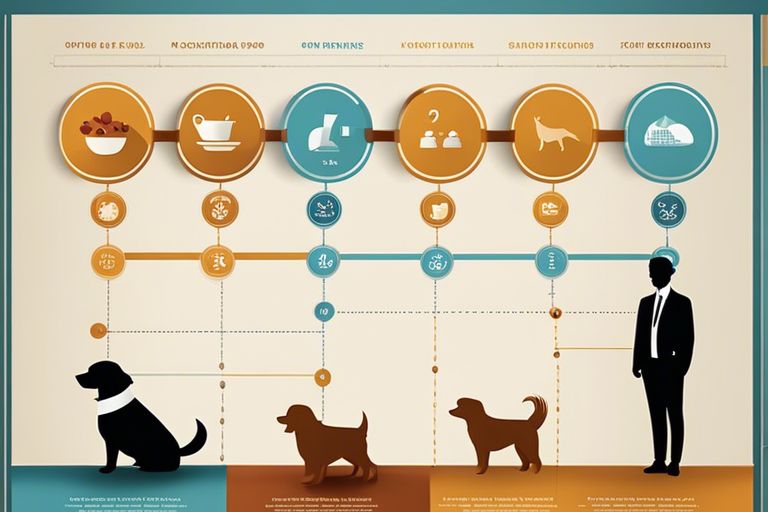Puppies and senior dogs have vastly different nutritional needs, yet many pet owners are unsure of how to properly tailor their pet’s diet to their specific life stage. Understanding the nutritional requirements for each stage of a dog’s life is crucial in promoting overall health and well-being. With proper nutrition, puppies can thrive during their rapid growth and development, while seniors can age gracefully with minimal age-related illnesses and ailments.
As responsible pet owners, it is our duty to ensure that our furry companions receive the best possible care, and that starts with providing the appropriate nutrition for their life stage. In this blog post, we will delve into the specific dietary requirements for dogs at different life stages, offering tips and recommendations for tailoring their nutritional needs to promote longevity and vitality. Whether you have a rambunctious puppy or a wise senior dog, understanding their unique nutritional needs is key to ensuring their overall health and happiness.
Key Takeaways:
- Importance of Tailoring Nutritional Needs: Understanding the unique nutritional requirements of different life stages is crucial for optimal health and well-being.
- Puppies: Puppies have higher energy and nutrient needs for growth and development, so their diet should be rich in proteins, fats, and essential vitamins and minerals.
- Adult Dogs: Adult dogs require a balanced diet to maintain their overall health and prevent weight gain, so their food should be portioned and tailored to their activity level.
- Senior Dogs: Senior dogs may have specific health issues, such as joint problems or decreased metabolism, requiring a diet with lower calories and additional supplements for joint support.
- Kittens: Kittens need a nutrient-dense diet to support their rapid growth and development, with higher levels of proteins, fats, and essential fatty acids.
- Adult Cats: Adult cats need a balanced diet to maintain their weight and overall health, with a focus on maintaining a healthy urinary system and preventing obesity.
- Senior Cats: Senior cats may require a diet tailored to their specific health issues, such as kidney disease or dental problems, with lower phosphorus and dental-friendly formulas.
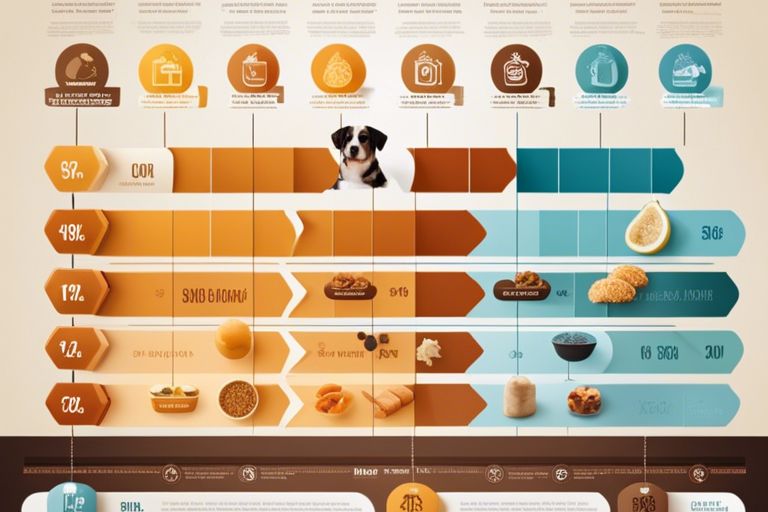
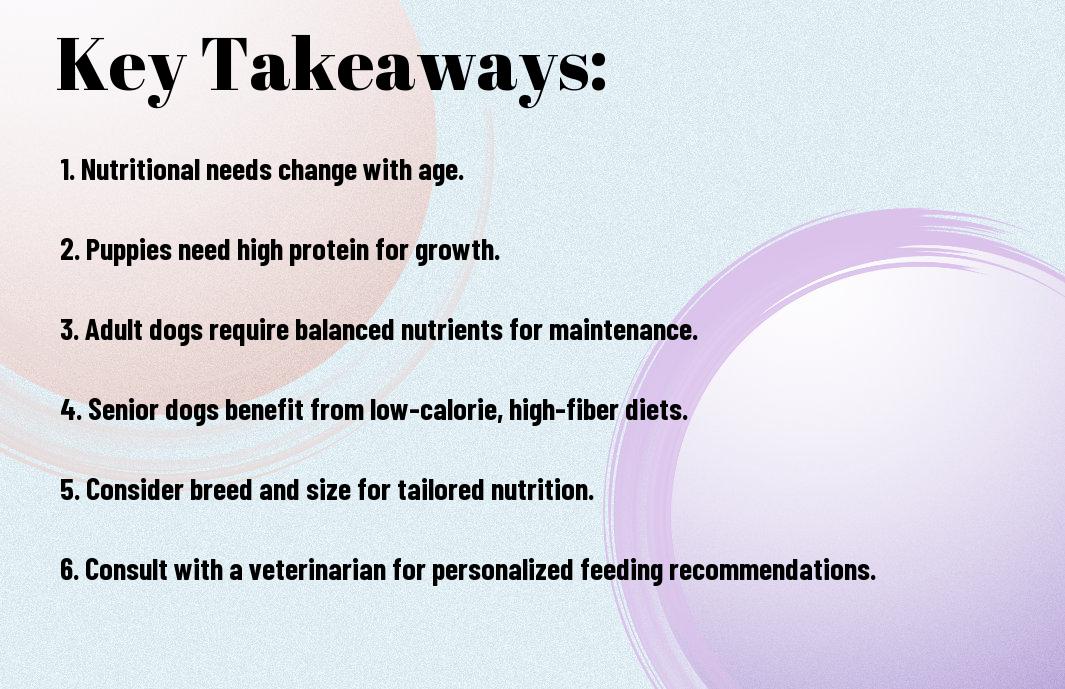
Nutritional Fundamentals for Dogs
While caring for our canine companions, it’s essential to prioritize their nutritional needs at every stage of life. From puppies to seniors, tailoring their diet to meet their specific requirements is crucial for their overall health and well-being. To learn more about this topic, check out our blog post on From Puppy to Senior: Tailoring Nutritional Needs (and …
Essential Nutrients for Canine Health
Nutrients such as protein, carbohydrates, fats, vitamins, and minerals play a vital role in supporting a dog’s overall health. Protein is crucial for muscle development, while carbohydrates provide energy. Fats are necessary for healthy skin and coat, and vitamins and minerals help maintain a strong immune system and support various bodily functions.
It’s important to ensure that your dog’s diet includes the right balance of these essential nutrients to support their overall health and longevity.
Dietary Considerations: Homemade vs. Commercial Diets
Health and convenience often come into play when considering the best diet for your dog. Homemade diets can provide a more personalized approach, allowing you to control the quality and selection of ingredients. On the other hand, commercial diets offer convenience and are formulated to meet specific nutritional standards.
Any decision regarding your dog’s diet should prioritize their nutritional needs and take into account factors such as age, activity level, and any potential health issues they may have.
Puppyhood: The Foundation
From the moment a puppy enters your home, they are embarking on a journey of growth and development. This crucial stage, known as puppyhood, sets the foundation for their future health and well-being. Providing the right nutrition during this time is essential to support their rapid growth and development.
Nutrient Requirements for Puppies
To support the healthy growth and development of puppies, it is vital to provide a balanced diet that meets their specific nutrient requirements. Puppies require higher levels of protein, fat, and essential vitamins and minerals to support their rapid growth, muscle and tissue development, and overall immune system function. Additionally, ensuring the right balance of calcium and phosphorus is crucial for proper bone and teeth development.
Addressing the Needs of Large Breed Puppies
To address the specific needs of large breed puppies, it is important to consider their growth rate and potential for skeletal development issues. Large breed puppies benefit from a diet formulated to support controlled growth, with slightly lower levels of fat and a balanced ratio of calcium and phosphorus to reduce the risk of orthopedic problems. Additionally, incorporating joint-supporting nutrients such as glucosamine and chondroitin can help promote healthy joint development in large breed puppies.
Puppies, large breed, nutrient requirements, growth, development, balanced diet, protein, fat, vitamins, minerals, calcium, phosphorus, immune system, skeletal development, joint-supporting nutrients, glucosamine, chondroitin.
Adolescence: Transitioning Diets
Now that your puppy is entering adolescence, it’s important to consider transitioning their diet to meet their changing nutritional needs. This life stage is crucial for their growth and development, so it’s essential to provide them with the right balance of nutrients to support their health and vitality.
Adjusting Portion Sizes and Meal Frequency
The transition from puppyhood to adolescence may require adjustments to portion sizes and meal frequency. As your dog grows, their energy needs will increase, so you may need to increase the amount of food they receive. It’s also important to monitor their body condition and adjust portion sizes accordingly to avoid overfeeding or underfeeding. Additionally, you may need to consider increasing the number of meals per day to accommodate their growing appetite and energy requirements.
Supplements and Growth Support
Meal Supplements and growth support may be necessary during adolescence to ensure your dog gets the necessary nutrients for healthy development. Consider adding supplements such as omega-3 fatty acids, glucosamine, and probiotics to support joint health, immune function, and overall well-being. These supplements can provide additional support during this critical growth stage, promoting strong bones, a healthy skin and coat, and a strong immune system. Any supplements chosen should be recommended by a veterinarian to ensure they are appropriate for your dog’s specific needs.
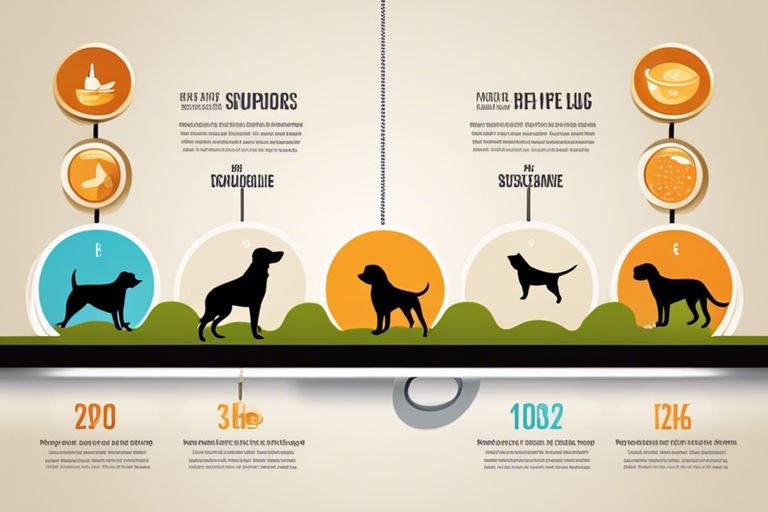
Adulthood: Maintenance and Health
Despite the playful nature of puppies and the regal grace of senior dogs, the majority of a dog’s life is spent in adulthood. This stage is characterized by the need for balanced nutrition that supports both maintenance and health. It is crucial to provide adult dogs with the appropriate nutrients to ensure they can thrive and live a long, healthy life.
Maintaining Optimal Weight and Muscle Tone
Maintenance of optimal weight and muscle tone is essential for adult dogs. Excess weight can lead to a range of health issues such as joint problems, heart disease, and diabetes. Regular exercise and a balanced diet are key factors in maintaining a healthy weight and promoting strong muscle tone in adult dogs. It is important to monitor food intake and adjust portion size according to the dog’s activity level and individual metabolism. Additionally, a high-quality dog food that is specifically formulated for adult maintenance can help support overall health and wellness.
Nutritional Strategies for Active and Working Dogs
Dogs that are active and working have higher energy requirements than their less active counterparts. Their nutritional needs differ to support their increased activity levels and ensure that they have the energy and nutrients needed for peak performance. Active and working dogs require a diet that provides a balance of protein, fats, and carbohydrates to fuel their energy needs. Additionally, supplements such as glucosamine and chondroitin can support joint health in these dogs, who may experience higher levels of wear and tear due to their increased activity.
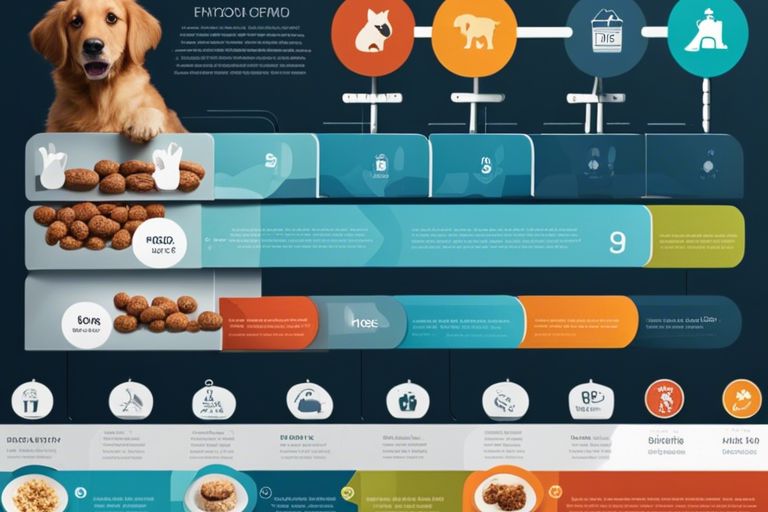
Middle-Aged Maturity: Preventive Nutrition
Not only is nutrition essential for providing energy and maintaining overall health, but it also plays a critical role in preventing age-related health issues in middle-aged dogs. As dogs reach their middle-aged years, their nutritional needs may change, and it’s important to provide them with preventive nutrition to support their well-being.
Managing Early Signs of Aging
Maturity in dogs is often accompanied by early signs of aging, such as decreased energy levels, changes in weight, and possible changes in coat quality. To address these concerns, it’s important to adjust their diet to support their changing needs. Providing a balanced diet rich in essential nutrients, including omega-3 fatty acids, can help support their overall health and potentially delay the progression of age-related issues.
The Role of Antioxidants and Joint Supplements
Preventive nutrition for middle-aged dogs should include the incorporation of antioxidants and joint supplements into their diet. Antioxidants help combat the effects of aging and support the immune system, while joint supplements can help support joint health and mobility. These supplements can play a crucial role in maintaining the overall health and well-being of middle-aged dogs.
Joint supplements containing glucosamine and chondroitin can help support joint health and mobility in middle-aged dogs, while antioxidants such as vitamin E and beta-carotene can help combat the effects of aging, supporting their overall health and well-being.
Senior Dogs: Supporting the Golden Years
Keep in mind that as dogs age, their nutritional needs change. It’s important to understand how to support your senior dog with the right diet to ensure they have a happy and healthy golden years. From decreased activity and metabolism to age-related health conditions, there are a few key considerations to keep in mind when tailoring a diet for your senior dog.
Dietary Adjustments for Decreased Activity and Metabolism
Metabolism slows down as dogs age, leading to decreased activity levels and potential weight gain. To support your senior dog’s changing metabolism, it’s important to adjust their diet to reflect their decreased energy needs. Look for senior-specific dog food formulas that are lower in calories and higher in fiber to help manage their weight and support their digestive health. Additionally, consider incorporating joint-supporting supplements such as glucosamine and omega-3 fatty acids to help with mobility and arthritis, common issues in senior dogs.
Managing Age-Related Health Conditions Through Diet
Managing age-related health conditions through diet is crucial to ensure your senior dog’s overall wellness. For example, senior dogs are more prone to dental issues, so incorporating dental chews and kibble that promotes dental health is important. Furthermore, older dogs may experience kidney or heart issues, so it’s essential to consult with your veterinarian to determine if your senior dog requires a special diet to support their specific health needs. Look for dog food formulas with reduced phosphorus levels and added antioxidants to support kidney and heart function.
The key to supporting your senior dog through age-related health conditions is to provide them with a diet tailored to their specific needs. By adjusting their diet to accommodate decreased activity and metabolism, as well as managing age-related health conditions, you can ensure your senior dog lives a comfortable and healthy life in their golden years. Consulting with a veterinarian and choosing the right senior-specific dog food formulas and supplements are essential steps in supporting your senior dog’s overall well-being.
Special Considerations
For pets with special needs, such as obesity, food intolerances, or allergies, it’s important to tailor their nutritional plan according to their unique requirements. By addressing these special considerations, you can ensure that your furry friend stays healthy and happy throughout their life.
Obesity Prevention and Weight Management
Obesity is a common issue in pets, leading to various health problems such as diabetes, arthritis, and heart disease. To prevent and manage obesity, it’s crucial to provide a balanced diet with appropriate portion control. Incorporating high-quality, low-calorie foods and regular exercise into your pet’s routine can help them maintain a healthy weight and reduce the risk of obesity-related health issues.
Hypoallergenic Diets and Food Intolerances
On the other hand, some pets may have food intolerances or allergies, which can cause digestive problems, skin issues, and discomfort. In these cases, a hypoallergenic diet that eliminates common allergens such as wheat, soy, and certain proteins, can help alleviate these symptoms. Paying close attention to your pet’s reactions to different foods and consulting with a veterinarian can help identify and manage food intolerances effectively.
Weight, allergies, intolerances, obesity, hypoallergenic diet, portion control, balanced diet, special considerations, nutritional plan
Conclusion
Now that we have explored the nutritional needs of dogs in every life stage, it is clear that tailoring their diet to their specific requirements is crucial for their overall health and well-being. From the high-energy needs of puppies to the reduced calories and maintenance of muscle mass in seniors, providing the right balance of nutrients is essential for a dog’s longevity and vitality.
By understanding the unique dietary needs of dogs at each stage of life, pet owners can make informed decisions about the food they provide for their furry companions. With the right nutrition, dogs can thrive and lead happy, healthy lives as beloved members of the family.
FAQ
Q: What are the nutritional needs of puppies?
A: Puppies require a diet rich in protein and fats to support their rapid growth and development. They also need essential vitamins and minerals for bone and muscle formation.
Q: How does the nutritional needs of adult dogs differ from puppies?
A: Adult dogs need a balanced diet that provides essential nutrients to maintain their overall health and energy levels. They require less fat and protein compared to puppies but still need a well-rounded diet to support their daily activities.
Q: What should be the focus of nutritional needs for senior dogs?
A: Senior dogs benefit from a diet that supports their aging joints and reduces the risk of chronic diseases. They need a lower calorie and higher fiber diet to maintain a healthy weight and digestive system.
Q: What are some common nutritional concerns for dogs of all life stages?
A: Dogs of all life stages need to have a diet that meets their specific needs and avoids common allergens. It’s important to monitor their weight and adjust their diet accordingly to prevent obesity or malnutrition.
Q: How can I tailor my dog’s diet to their specific life stage?
A: It’s crucial to consult with a veterinarian to determine the best diet for your dog’s life stage. They can provide personalized recommendations based on your dog’s breed, size, and individual health needs.
Q: Are there specific dietary supplements that can benefit dogs at different life stages?
A: Certain dietary supplements, such as glucosamine and omega-3 fatty acids, can benefit dogs at different life stages by supporting joint health and cognitive function. However, it’s essential to consult with a vet before adding any supplements to your dog’s diet.
Q: How can I monitor my dog’s nutritional needs as they age?
A: Regular visits to the vet and monitoring your dog’s weight and energy levels can help you stay aware of any changes in their nutritional needs as they age. Adjusting their diet and exercise routine accordingly can help maintain their health and well-being.
